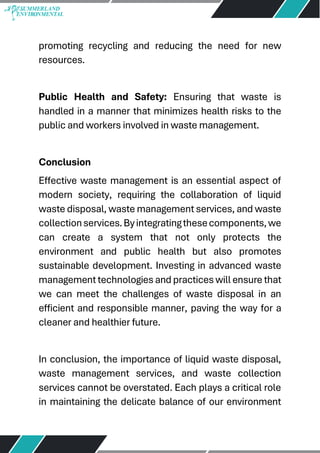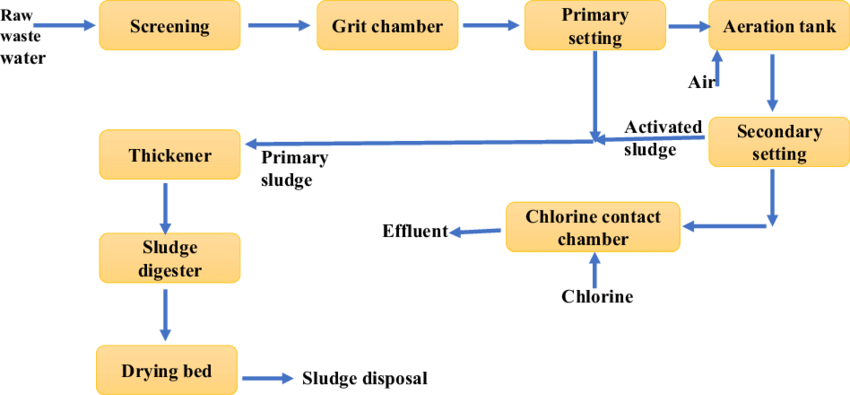The Greatest Guide To Reclaim Waste
The Greatest Guide To Reclaim Waste
Blog Article
The Best Strategy To Use For Reclaim Waste
Table of ContentsThe Best Guide To Reclaim WasteThe Greatest Guide To Reclaim WasteLittle Known Facts About Reclaim Waste.Reclaim Waste for DummiesA Biased View of Reclaim Waste
Domestic sewer waste refers to the waste and items from a domestic septic storage tank. The proper management and disposal of residential sewer waste require liquid waste to be transferred to a sewage treatment plant where the proper methods and devices are used to purify and dispose of waste.
Business waste typically consists of potential dangers, such as combustible products or a combination of fluid and solid waste products, and requires an extra innovative and thorough disposal process. The disposal of business waste typically includes the filtration of waste before transport to ensure risk-free and proper disposal. Industrial waste is produced from results and drainage of industrial procedures and production.
This type of waste can not utilize the same sewer management transport or processes as septic or industrial fluids. The hazardous waste management procedure requires the evaluation and screening of liquid waste before it undertakes the disposal process (liquid waste removal melbourne). Drainage waste is the liquid waste that comes from overflow and excess stormwater in extremely inhabited areas or cities
Overflow waste can create contamination and flooding if not dealt with effectively. Learn a lot more concerning sewer cleaning and waste administration. Guaranteeing proper waste administration can stop calamities and minimize ecological damage. Both individuals in property settings and professionals in industrial or production markets can take advantage of recognizing the processes and regulations of fluid waste monitoring.
The Only Guide for Reclaim Waste
Contact PROS Providers today to find out about our waste management and disposal solutions and the correct ways to look after the fluid waste you create.
(https://medium.com/@leonaube33101/about)This so-called 'wastewater' is not only an important source but, after therapy, will be launched to our land, rivers or the ocean. Made use of water from commodes, showers, bathrooms, kitchen area sinks, washings and commercial processes is understood as wastewater.

water made use of to cool down equipment or tidy plant and equipment). Stormwater, a form of wastewater, is overflow that streams from agricultural and metropolitan locations such as roofs, parks, yards, roadways, paths and seamless gutters into stormwater drains, after rainfall. Stormwater streams untreated directly to regional creeks or rivers, at some point reaching the ocean.
The Single Strategy To Use For Reclaim Waste
In Queensland, many wastewater is dealt with at sewage treatment plants. Wastewater is moved from residential or commercial websites through a system of sewers and pump terminals, known as sewerage reticulation, to a sewage treatment plant. City governments build, preserve and operate most sewer treatment plants. Operators are accredited under the Environmental Management Act 1994 to release cured wastewater at an acceptable environmental criterion right into waterways.
The Department of Natural Resources encourages city governments concerning managing, operating and preserving sewerage systems and treatment plants. In unsewered areas, city governments may need homeowners to set up individual or home sewer treatment systems to deal with domestic wastewater from commodes, additional info cooking areas, bathrooms and laundries. The Department of Natural Resources authorizes using home systems when they are verified to be effective.
In some new class, treatment of some stormwater to eliminate clutter, sand and gravel has begun using gross toxin traps. Wastewater therapy happens in 4 stages: Removes solid matter.
Utilizes small living organisms recognizes as micro-organisms to damage down and get rid of remaining dissolved wastes and great bits. Micro-organisms and wastes are included in the sludge.
Reclaim Waste Can Be Fun For Everyone
Nutrient removal is not offered at all sewer treatment plants since it calls for pricey specialised equipment. Clear fluid effluent produced after therapy may still include disease-causing micro-organisms - liquid waste disposal.

The majority of wastewater streams into the sewerage system. Under the Act, neighborhood governments administer authorizations and licences for eco appropriate tasks (Ages) involving wastewater launches that could have a neighborhood effect.
Get This Report on Reclaim Waste
Monitoring offers accurate information regarding water high quality and can validate that permit conditions are being satisfied. The info acquired with monitoring offers the basis for making water high quality decisions.
Report this page